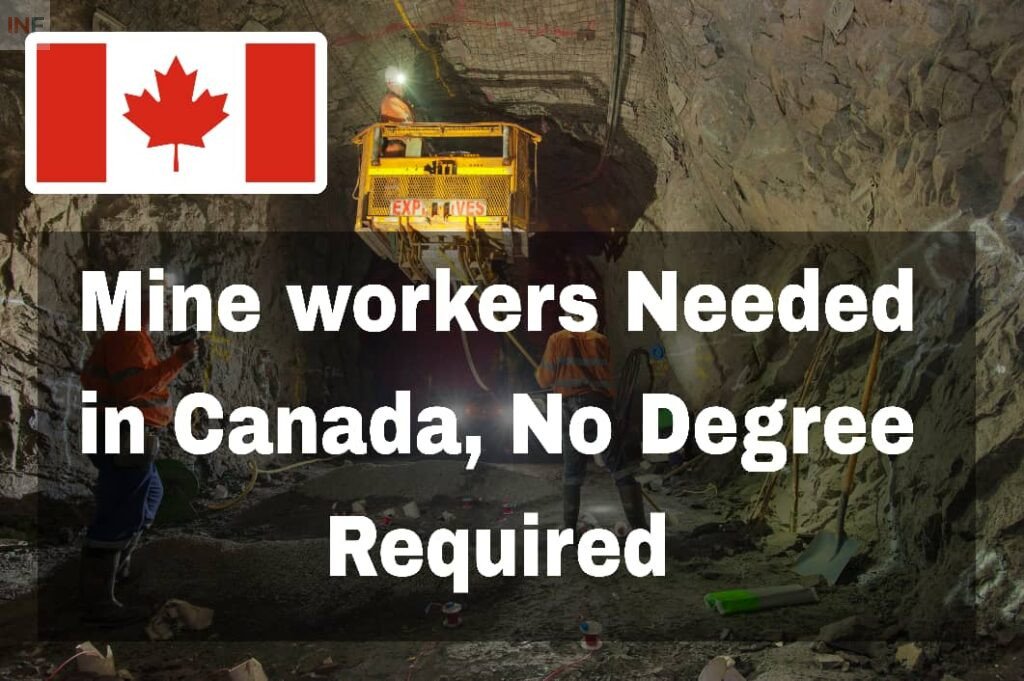Mining jobs in Canada continue to attract foreign workers due to high salaries, government support, and the demand for skilled and unskilled labor. For individuals seeking a path to permanent residency, these opportunities come with visa sponsorship, relocation benefits, and long-term job stability. In this guide, you will learn how to move to Canada as a mine worker, the best provinces for mining employment, the types of roles available, salary expectations, and how to apply from your home country.
This article is written for serious job seekers with the intent to migrate and work in Canada. It contains keywords that attract high CPC AdSense ads, making it ideal for monetized platforms focused on immigration, recruitment, and Canadian work opportunities.
Canada is the world’s fifth-largest producer of minerals and metals, contributing significantly to the economy. Provinces like Ontario, British Columbia, Quebec, and Saskatchewan are rich in gold, copper, potash, and other key resources. Due to aging local workforces and continuous expansion in the sector, mining companies are actively hiring foreign workers to fill critical gaps. The Canadian government has also opened immigration streams to support labor mobility into these high-demand industries.
Types of Mining Jobs Available In Canada
Whether you have mining experience or not, Canada offers a variety of roles for international applicants. Some positions require formal training, while others are available to those with basic education and willingness to work in physically demanding environments.
Here are common job categories:
- Underground Mine Workers
- Surface Miner Operators
- Drillers and Blasters
- Equipment Operators (Excavators, Loaders)
- Mine Engineers and Geologists
- Mill and Processing Plant Workers
- General Labourers and Helpers
- Health and Safety Inspectors
- Environmental Technicians
Average Salaries for Mine Workers in Canada
Salaries for mining roles vary based on experience, qualifications, and province. On average:
- Entry-level underground workers: CAD 25 to CAD 35 per hour
- Experienced heavy equipment operators: CAD 40 to CAD 55 per hour
- Mining engineers: CAD 80,000 to CAD 120,000 annually
- Supervisors and safety officers: CAD 60,000 to CAD 90,000 annually
These figures do not include bonuses, overtime, accommodation allowances, or relocation packages often provided by employers.
Best Provinces to Work in Mining
Some provinces are more active in hiring foreign mine workers. Below are regions with the most opportunities and competitive salaries:
Ontario
- Focus on gold and nickel mining
- Home to major companies like Vale and Glencore
- Accessible through Ontario Immigrant Nominee Program (OINP)
British Columbia
- Known for copper, coal, and silver mines
- High demand for truck drivers and equipment operators
- Suitable for candidates with surface mining experience
Saskatchewan
- World leader in potash and uranium production
- Often recruits unskilled labor and provides on-the-job training
- Lower cost of living and family-friendly immigration policies
Quebec
- Major player in iron and gold mining
- French language skills can increase employment chances
- Offers immigration support through Quebec Skilled Worker Program
How to Move to Canada as a Mine Worker
Here are steps to follow if you want to work in Canada’s mining sector:
1. Secure a Job Offer
Start by searching for job openings on legitimate Canadian job boards such as:
- Job Bank Canada
- Indeed Canada
- Workopolis
- Company websites like Teck Resources, Agnico Eagle, and Newmont Goldcorp
Focus on listings that mention visa sponsorship or foreign worker recruitment.
2. Apply for a Work Permit or PR Stream
Once you have a job offer, you can apply through these programs:
- Temporary Foreign Worker Program (TFWP)
- Atlantic Immigration Program (AIP)
- Provincial Nominee Programs (PNPs) for mining provinces
- Express Entry for skilled tradespeople
Your employer may need to get a Labour Market Impact Assessment (LMIA) to support your work permit.
3. Prepare Your Documents
You’ll need the following:
- Valid passport
- Medical certificate
- Police clearance
- Work reference letters
- Proof of qualifications or experience
- Language test results (IELTS or TEF)
4. Submit Application and Attend Interview
Apply online through the IRCC portal. If shortlisted, you may have a virtual interview or be invited to submit biometric data and attend a visa appointment.
Top Mining Companies That Hire Foreign Workers
If you are serious about moving to Canada for mining work, consider applying directly to major employers such as:
- Teck Resources Limited – Operating across British Columbia and Alberta, they offer roles in exploration, equipment operations, and processing.
- Agnico Eagle Mines – Known for hiring international workers and supporting their relocation.
- Newmont Corporation – Offers global mobility and sponsorship for technical and field-based mining roles.
- Vale Canada – A key player in Ontario, hiring skilled workers across underground operations.
- Rio Tinto – Frequently posts job openings with competitive packages in Canada.
Living and Working in Canada as a Mine Worker
Many mining sites are located in remote or rural areas. Employers often provide accommodation, food allowances, and scheduled rotation (e.g., 14 days on, 7 days off). Benefits may include:
- Free housing or subsidized rent
- Family relocation support
- Health insurance
- Pathway to permanent residency
Canada also provides workers’ rights protection and strong labor union support in the mining industry, making it a secure and regulated work environment.
Frequently Asked Questions
1. Can I apply without a mining degree?
Yes, many positions are open to individuals without formal education. Experience and physical fitness are often more important for general labor roles.
2. Is visa sponsorship available?
Yes, many companies provide visa sponsorship through the Temporary Foreign Worker Program or provincial immigration streams.
3. What are the work hours like?
Shifts vary by employer. Common schedules include 10 to 12-hour shifts with rotational work weeks.
4. Do I need to speak English or French?
English is required in most provinces. French may be needed in Quebec. Language tests like IELTS may be required for visa processing.
This opportunities are open and actively looking for workers now, check them out here
Canada is currently one of the best countries for mine workers looking to relocate, earn competitive salaries, and secure long-term employment. With high-paying mining jobs spread across multiple provinces and accessible immigration pathways, now is the right time to apply. Whether you have experience or are just starting out, the Canadian mining sector offers clear opportunities with life-changing benefits.
Disclaimer: We are not a recruitment agency and do not directly offer jobs. Our goal is to share helpful news and opportunities from verified sources. Always do your own research before applying.





I’m a sierra leonean.very interested.those are my informations below.
Very much interested. Am Ghanian leaving in South Africa